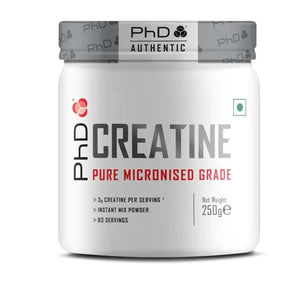
Product Insights
Discover more about the products in this article

PHD Creatine Powder
Featured Products
Navigating the Field: What Supplements are Safe and Effective in English Football?
English football, governed by The Football Association (FA), has specific rules and guidelines regarding supplement use, primarily focusing on anti-doping regulations and protecting the overall well-being of players. It is very important that you keep in mind that regulations evolve over time, so it’s essential to refer to the latest information. This can be found at The FA’s Rules & Regulations website (Taking Nutritional Supplements), and the Informed Sport website where you can access supplement safety resources.
Football demands peak physical performance from players, pushing them to the limits of endurance and agility. In the quest for optimal fitness, footballers often explore supplements to complement their training and nutrition. However, the crowded supplement market can be overwhelming, leaving players wondering what is safe and effective for their specific needs.
In this blog, we delve into the world of supplements, unravelling the mystery and highlighting some of the best supplements to help players in English football make informed choices that enhance their performance without compromising their well-being or eligibility to play.
Creatine Monohydrate: Backed by extensive research, creatine is a safe and effective supplement for footballers aiming to enhance strength, power, and overall performance. It helps in replenishing ATP, the energy currency of cells, fostering quick bursts of energy essential for sprinting and powerful movements on the field. Try adding PHD Creatine Powder into your routine.
BCAAs (Branched-Chain Amino Acid) supplements can be advantageous for football players, as they provide a direct and rapidly absorbed source of essential amino acids, including leucine, isoleucine, and valine. These amino acids play a crucial role in promoting muscle protein synthesis, reducing muscle soreness, and aiding in muscle recovery, which is particularly beneficial for football players engaging in intense physical activity and requiring swift recuperation between matches and training sessions. Increase your BCAA intake by adding Applied Nutrition BCAA Amino-Hydrate into your diet.
Beta Alanine: supplements offer distinct advantages for football players by enhancing muscular endurance and buffering against the accumulation of lactic acid during intense periods of play. It aids in delaying fatigue, allowing football players to sustain high-intensity efforts for more extended periods, particularly beneficial in matches where endurance and repeated bursts of speed are critical. Using Science in Sport's revolutionary product, 100% Pure Beta Alanine enhances performance during short bouts of high-intensity exercise.
Omega-3 supplements such as OTE Omega-3 Fish Oil Supplement offer notable benefits to football players, aiding in both performance and recovery by reducing inflammation and promoting joint health, which is crucial for the agility and mobility demanded on the football pitch. Additionally, the cognitive advantages associated with omega-3 fatty acids may enhance decision-making and concentration, providing a multifaceted support system for football players striving for peak physical and mental performance.
Electrolyte supplements play a crucial role in football by helping to maintain optimal hydration and supporting essential physiological functions. These supplements, rich in minerals like sodium and potassium, contribute to preventing dehydration, sustaining energy levels, and reducing the risk of muscle cramps, ensuring players can perform at their best throughout the game.
Caffeine supplements can be beneficial for football players by enhancing both physical and cognitive aspects of performance. The stimulant properties of caffeine can contribute to increased alertness, improved endurance, and a reduction in perceived effort, making it a valuable tool for football athletes seeking a competitive edge during matches and training sessions.




